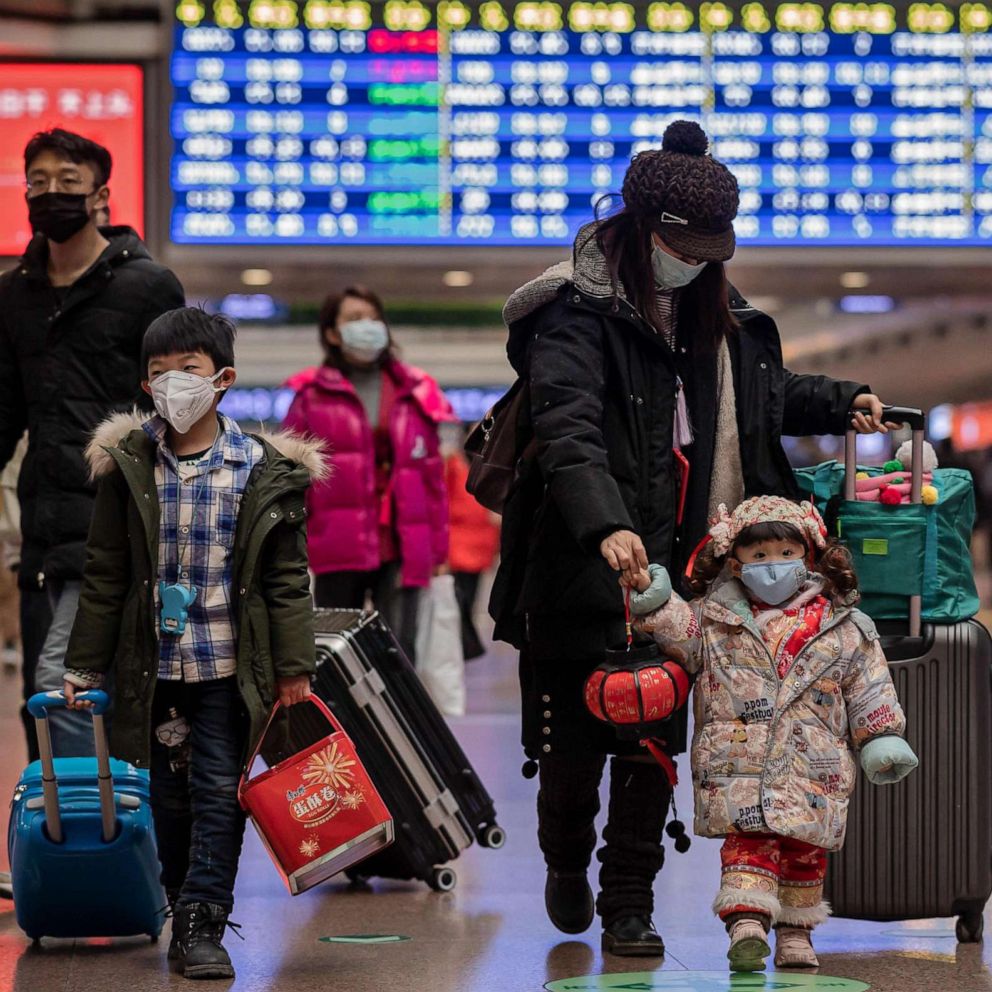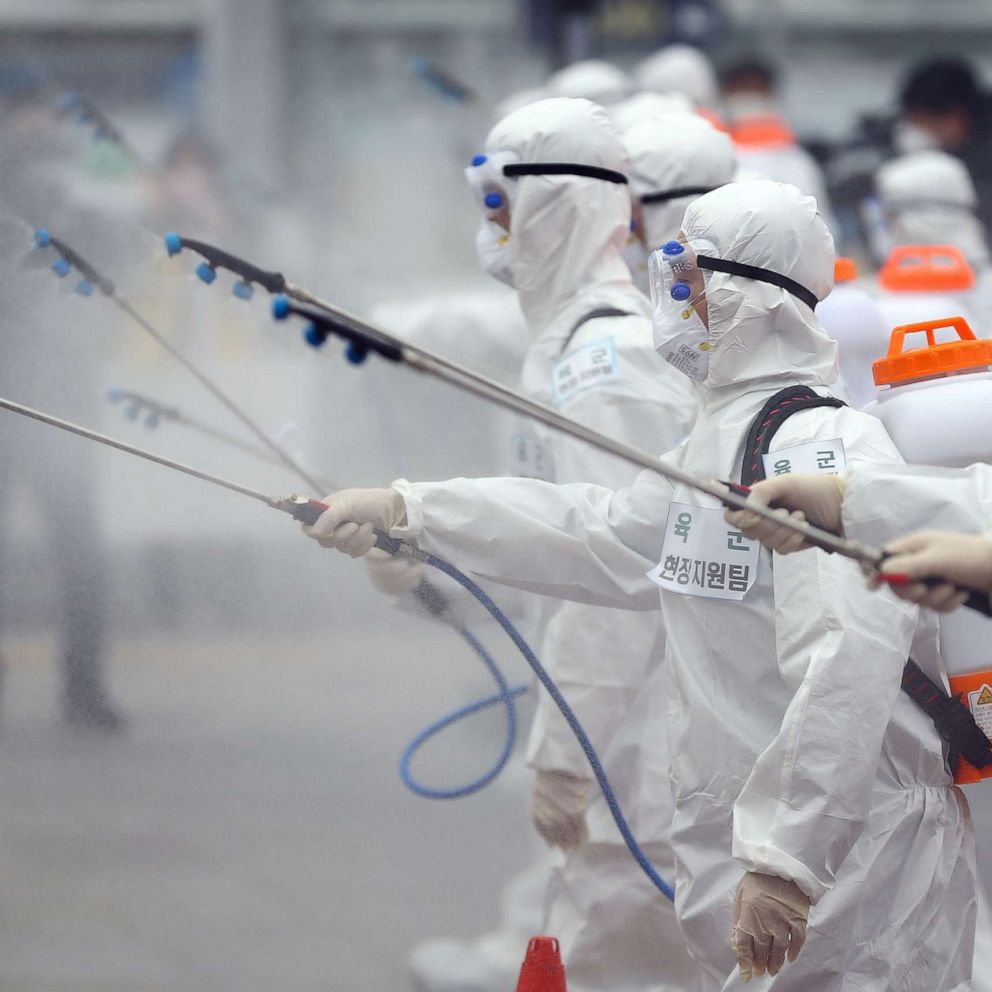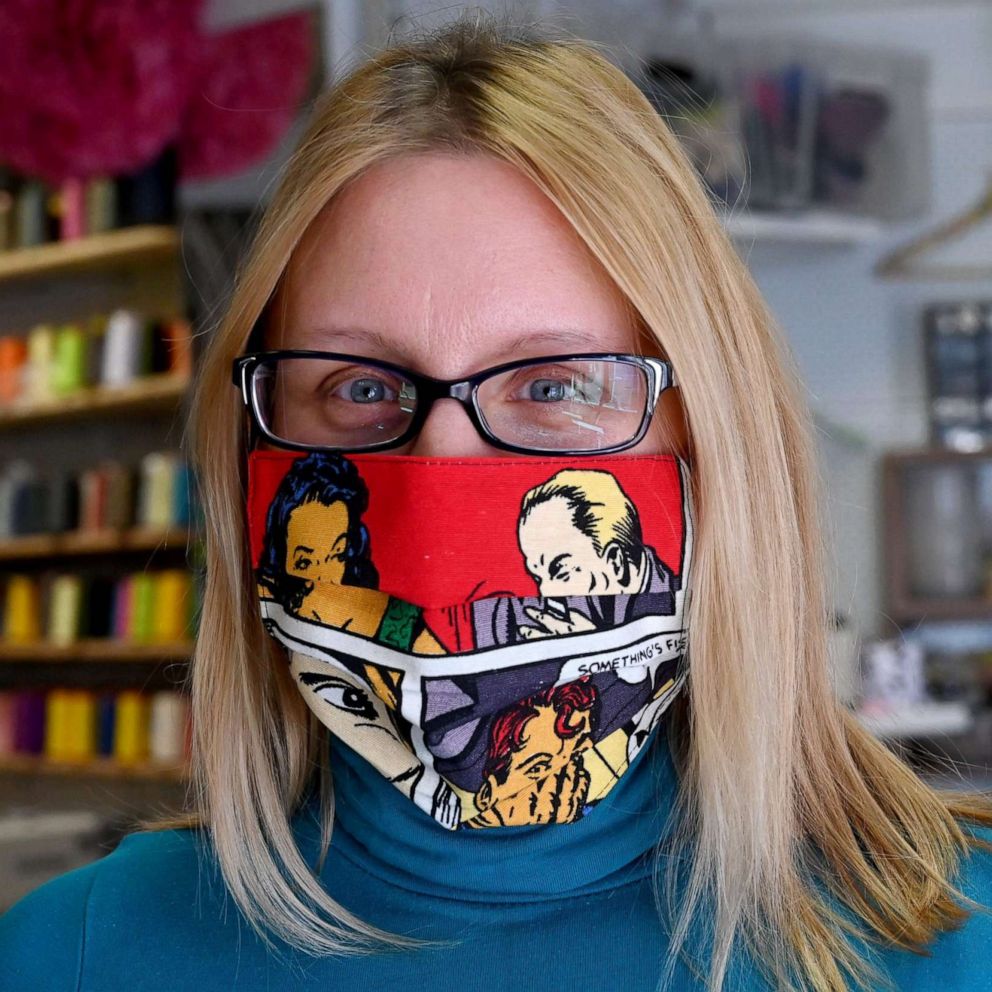Coronavirus government response update: Amid shortage, White House say hospital workers could reuse cloth gowns
Vice President Pence says new guidance will say the gowns can be recycled.
As the nation's top health expert said Thursday that he thinks the U.S. death toll from COVID-19 could be far less than the original White House projection of up to 240,000 lives, President Donald Trump is preparing to form a second coronavirus task force focused on reopening the economy -- while jobless claims soared for the third week in a row.
Fauci confirmed on Thursday morning that social distancing and behavior changes are "starting to have a real effect" and that the virus death toll may look "more like 60,000 than the 100,000 to 200,000" initially predicted.
Amid that comparatively positive development, the president at Wednesday's briefing argued once again that Americans "want to go back" to work and are going "stir crazy," before CDC Director Robert Redfield announced new guidelines that would allow what he called "essential workers" to return to their jobs sooner.
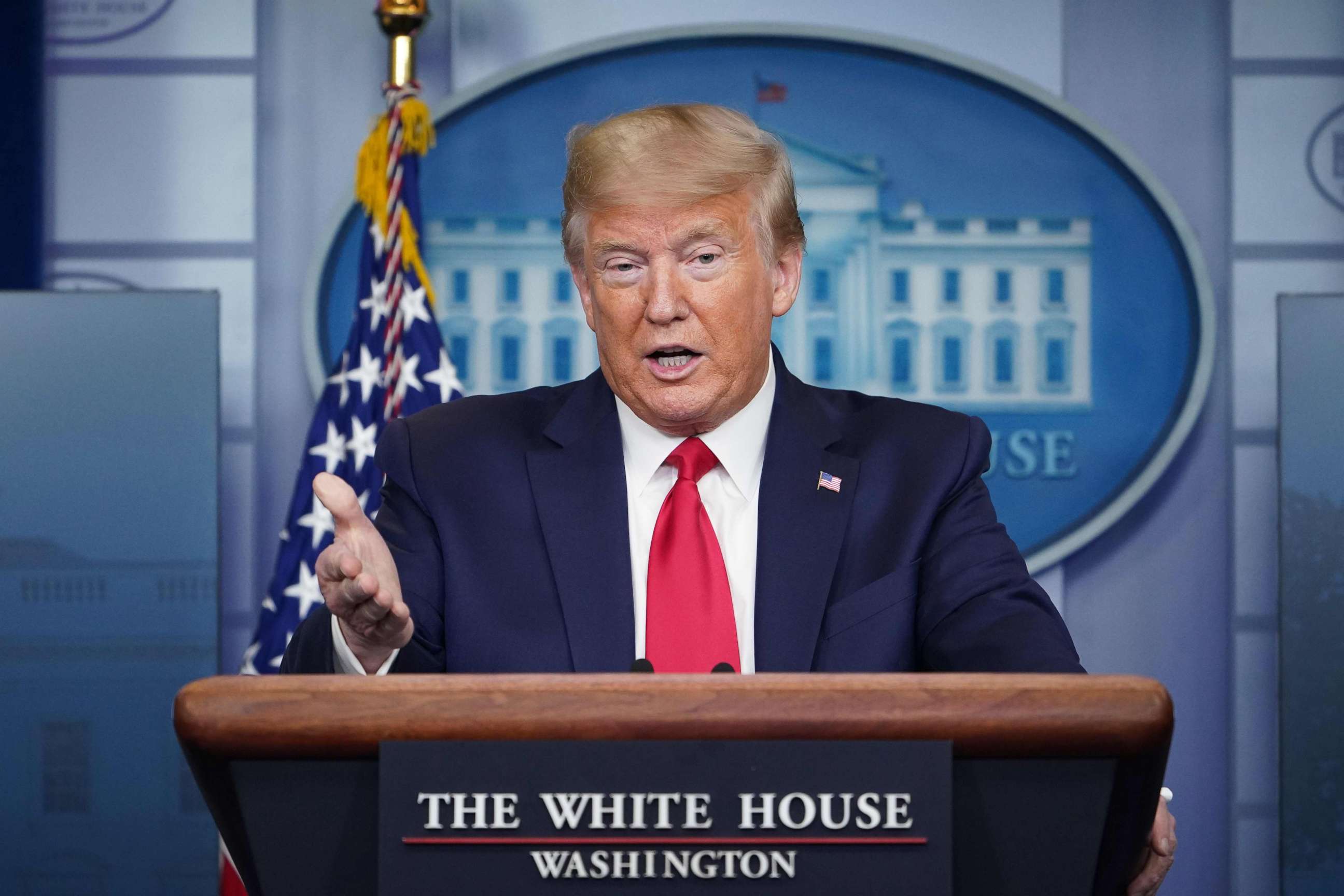
Redfield said asymptomatic health care workers, first responders and those working in food supply, among others, can now return to work even after being exposed to someone infected with COVID-19, under the guidance.
Even with one key model projecting tens of thousands of fewer deaths by the end of summer, doctors of the coronavirus task force warn that current mitigation levels and social distancing must continue or even intensify to keep that number down, as the country nears it's expected peak one-day death toll.
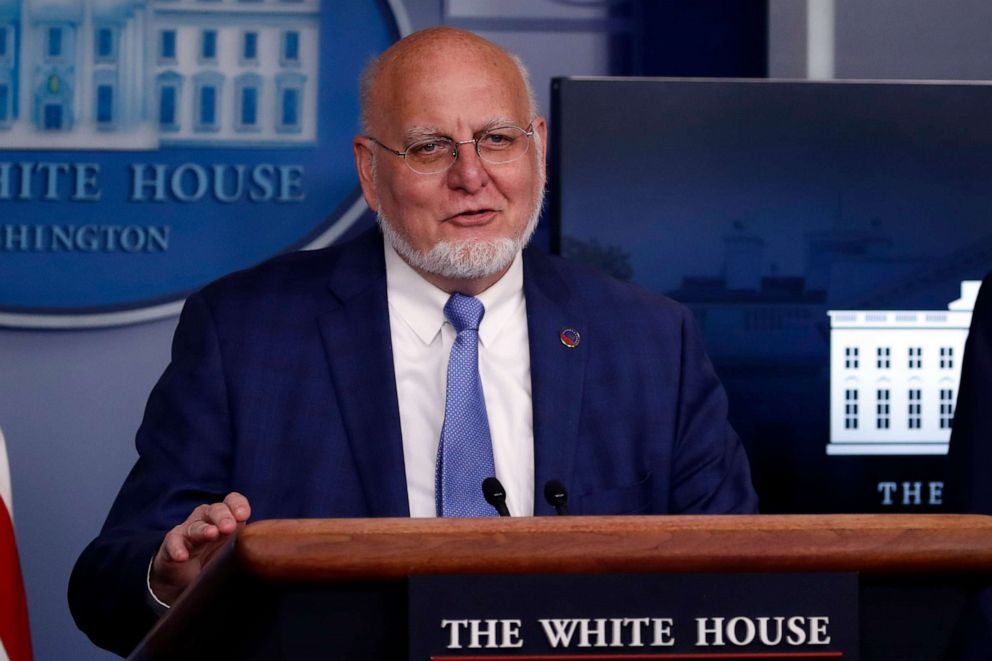
Tune into ABC at 1 p.m. ET and ABC News Live at 4 p.m. ET every weekday for special coverage of the novel coronavirus with the full ABC News team, including the latest news, context and analysis.
Here are Thursday's most significant developments in Washington:
- At daily briefing, Trump touts testing numbers amid talk of trying to restart the economy
- Fauci: 'Good news' that despite increase in deaths, 'dramatic decrease' in New York hospitalizations
- The White House is preparing to announce a second coronavirus task force focused on the economy
- An interim $250B relief package to small businesses has stalled in the Senate as party leaders clash
- Pence says White House to issue guidance that hospital workers should reuse cloth gowns
Here are the latest developments in the government response:
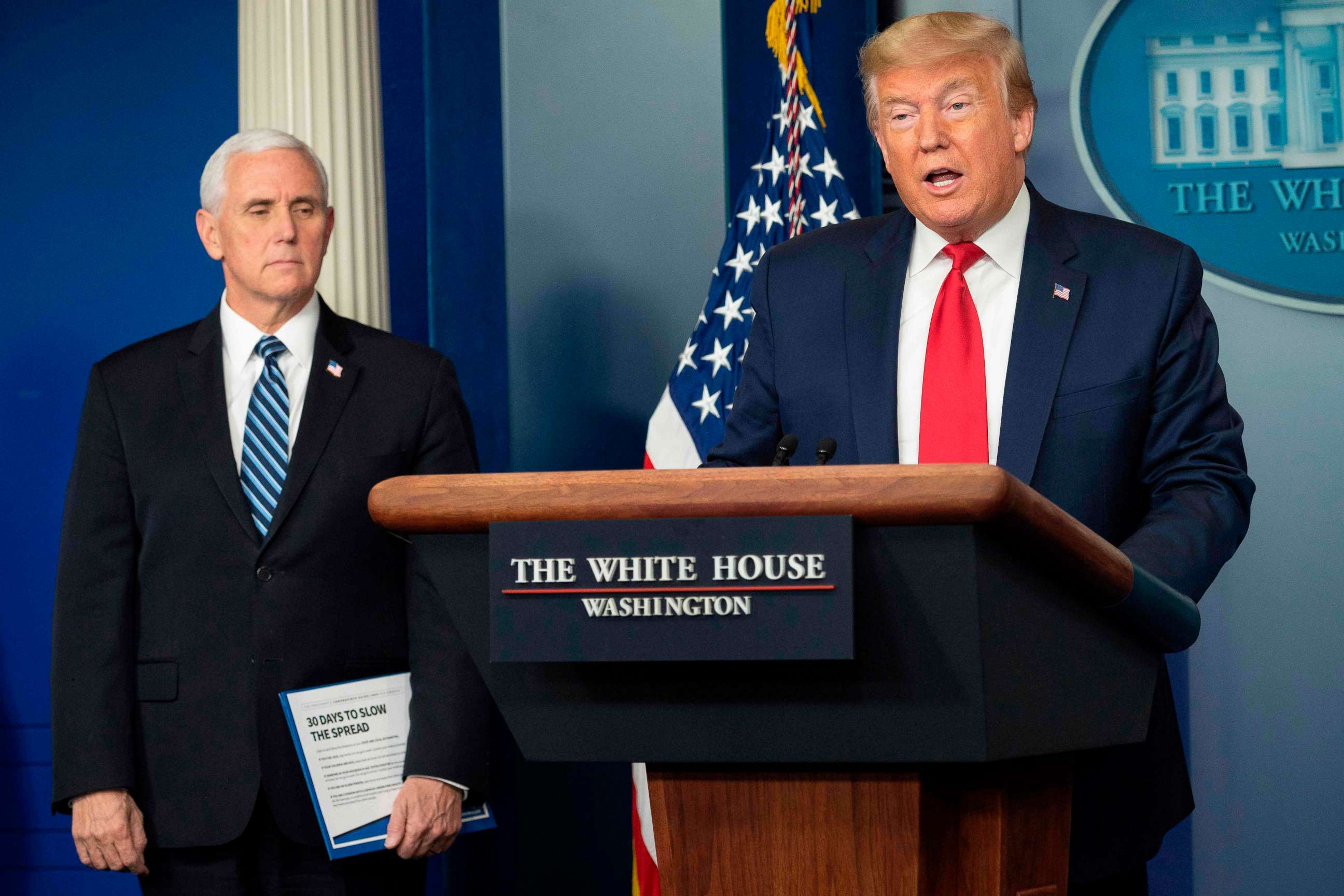
Trump touts testing numbers amid talk of trying to restart the economy
At the daily White House briefing Thursday, President Trump announced that the U.S. has performed over two million COVID-19 tests, calling it "a milestone anywhere."
"Our tests are highly sophisticated and highly accurate. At the same time, we are making important progress on the economic front of this war," the president said, transitioning into his plan to "reopen" the country.
Asked if an "adequate nationwide testing system" must be in place before sending Americans back to the workplace, the president again touted the country's ability to test before indicating that people could go back to work while testing is still being rolled out.
"We want to have it. We will see if we have it. Do you need it? No. Is it a nice thing to do? Yes," Trump said.
The administration response has been heavily criticized for not performing nearly as many tests -- per capita --as other countries.
The president performed somewhat of a balancing act Thursday, in an attempt to acknowledge the pain many Americans are already feeling as the death toll from the virus soars, while also assuring investors and workers that he has a plan to get the economy back on track.
“You can never do anything about the people that lost their loved ones, and the great friendships, and I'm not sure a lot of people will ever be the same -- but I think our country from an economic standpoint, we have tremendous stimulus plans. I think what's going to happen, we will have a big bounce rather than a small bounce,” Trump said.
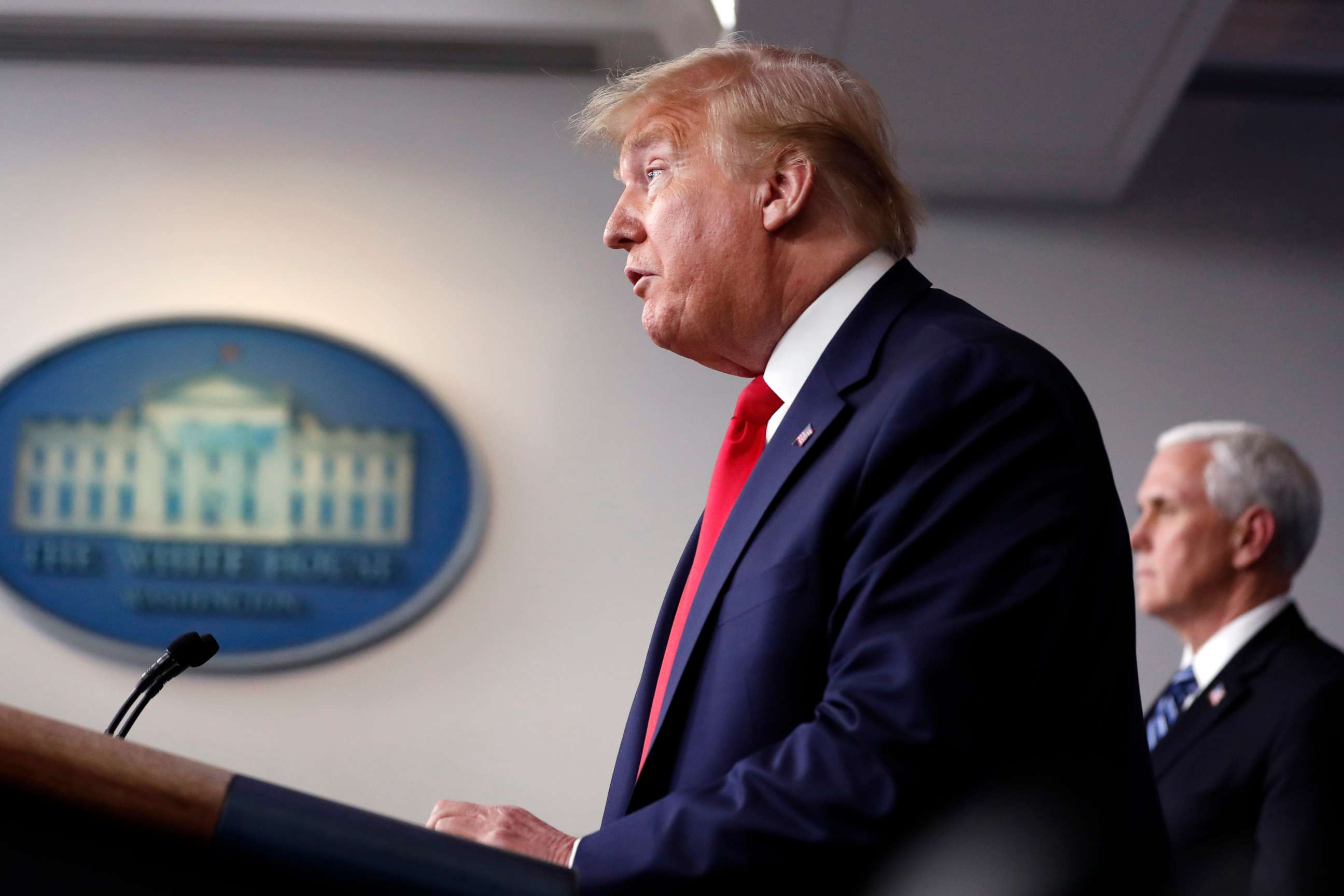
"I think we are going to open up strong, open up very successfully, and even more successfully than before," he added.
Trump told reporters he has a "strong feeling" that the economy is going to do very well and bounce back.
"I think we are going to open up strong, open up very successfully, and even more successfully than before," Trump said.
Trump's comments come as today's jobless numbers reached new heights, with over 15 million Americans filing for unemployment over the last few weeks.
But he repeated his optimism the pandemic could be overcome.
"We are at the top of the hill, pretty sure we are at the top of the hill, and now we are going downward," Trump said. "In some cases we have already started that process.
Pence says White House to issue guidance that hospital workers should reuse cloth gowns
The president then handed off the briefing to Vice President Mike Pence, who began his remarks by acknowledging it's been a "difficult week" for many Americans.
"I want to assure you that all of us working at every level understand that these are not numbers. These are lives," Pence said, in a particularly somber moment. "And our heartfelt condolences during this heartbreaking week go out to every American family that's lost a loved one."
As the federal national stockpile of personal protective equipment nears depletion, Pence announced that the task force is looking into new guidance -- "in the next 24 hours" -- that would allow for the recycling of cloth hospital gowns.
“It was observed that 20 years ago, most physicians and most surgeons wore cloth gowns every day and laundered them, but it's transitioned to disposable gowns. And we're working very rapidly, in the next 24 hours, and will have guidance for hospitals and health care workers about the ability to in effect recycle gowns and make sure we have the supplies we need,” the vice president said.
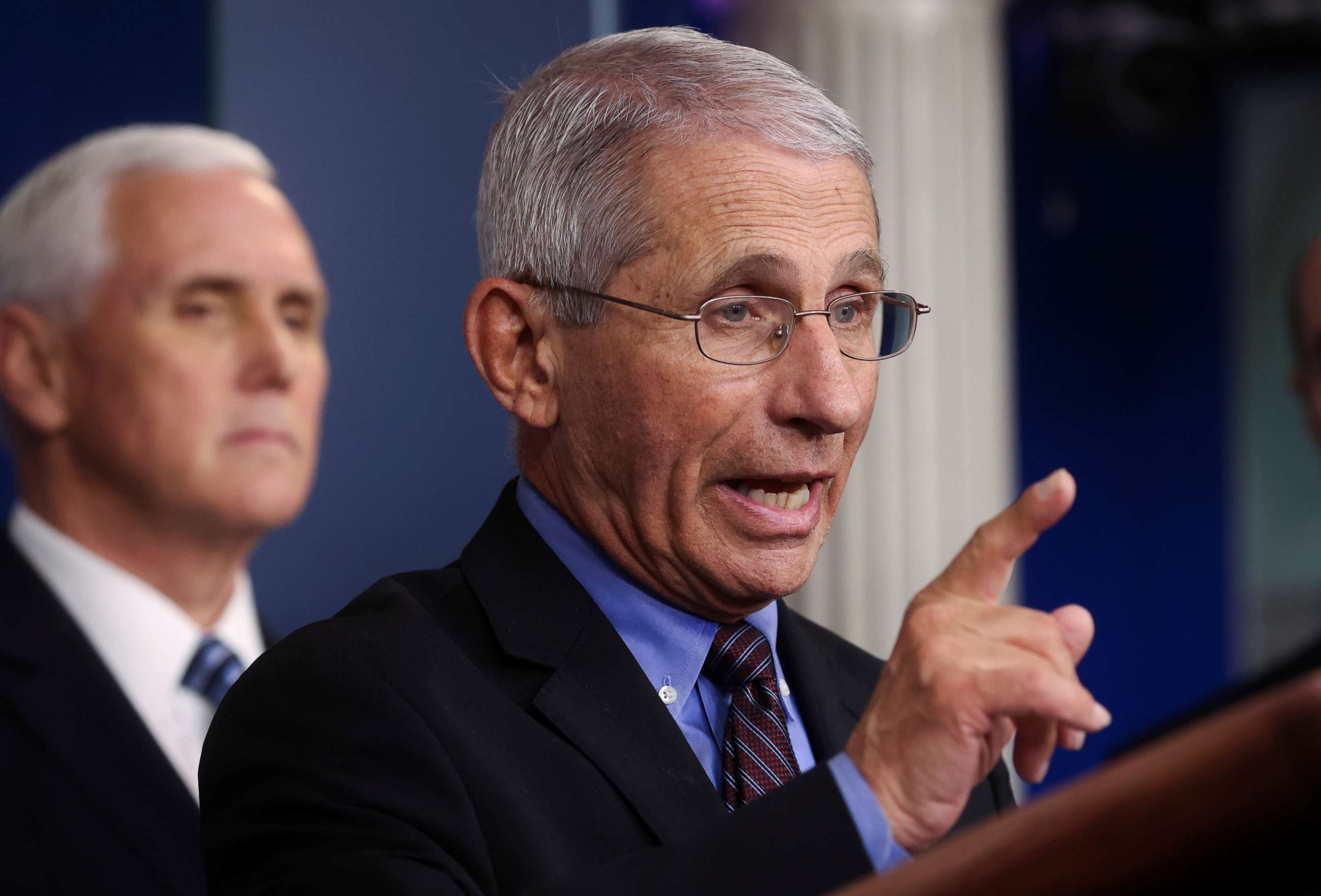
Fauci: 'Good news' that despite increase in deaths, 'dramatic decrease' in NY hospitalizations
A self-described “cautious optimist,” Dr. Anthony Fauci, the nation's top expert on infectious diseases, shared what he called “good news” at Thursday’s briefing.
“As we are seeing the increase in death, we are seeing a rather decrease -- dramatic decrease -- in demand for hospitalization,” Fauci said about the situation in New York. “That means what we are doing is working and therefore, need to continue to do it.”
Though Fauci seemed encouraged by the results, he went on to caution putting too much stock in models and continued to emphasize that social distancing was the reasoning behind the projected death toll drop.
“When you take the data you have and reinsert it into the model, the model modifies,” Fauci said, explaining the drop in one key model from nearly 90,000 deaths by August to roughly 60,000, since social distancing measures became stricter. “Data is real. Model is hypothesis. That is what you have to do and that is what we are seeing.”
Additional funding for small businesses fails in Senate after Dem, GOP plans clash
As small businesses across the country are crushed by the economic fallout from the spreading pandemic, the Senate on Thursday failed to approve an emergency funding infusion for the Paycheck Protection Program, a federal plan designed to extend loans to keep those ailing businesses afloat and workers getting paid.
Democrats blocked a request from Senate Majority Leader Mitch McConnell to unanimously approve the $250 billion replenishment to the original $350 billion fund, demanding more aid for hospitals and other needs be included.
"To my Democratic colleagues, please, do not block emergency aid you do not even oppose just because you want something more," McConnell said.
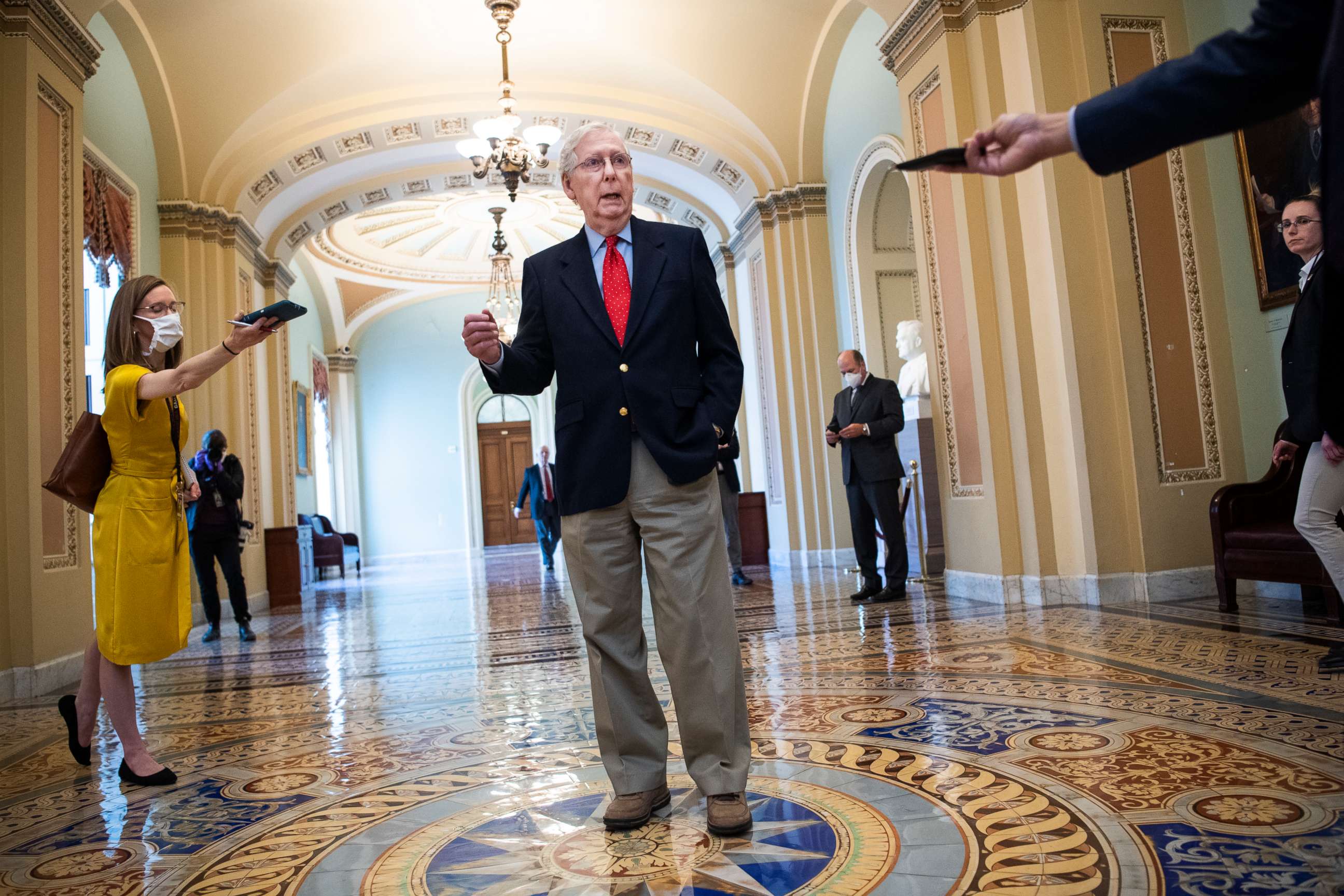
But Democrats decried McConnell's move as "a political stunt," claiming that the leader knew beforehand that the measure would fail, particularly after his Democratic counterpart, Sen. Chuck Schumer, had unveiled a relief package doubling the GOP request earlier this week.
"Yes, we need more money," Maryland Sen. Chris Van Hollen said. "But for goodness sakes, let's take the opportunity to make this program work better for the very businesses it is designed to help."
Treasury Secretary Steve Mnuchin is negotiating with Democrats, but it's unclear where those discussions will land.
ABC News' Trish Turner
Fauci confirms Americans 'bending the curve' but warns against complacency, says most U.S. cases 'probably' came from Europe
Dr. Anthony Fauci, in an interview on ABC's "Good Morning America," expressed hope that by the end of April the country will see a "bending in the curve" of the COVID-19 outbreak but said ultimately, "the virus itself will determine the guideline" on when it's safe to loosen social distancing recommendations.
"I do hope by the time we get there that we will see that curve, that bending in the curve …There's some indication that that might be going on, particularly in New York," Fauci told George Stephanopoulos Thursday morning.
Fauci said it's "tough to tell" if the virus has hit its peak in New York, even as he said he's cautiously optimistic that that may be happening.
Asked about studies suggesting the virus was spreading in New York in mid-February -- with most of those cases coming from Europe -- Fauci said that's "probably correct."
The president frequently trumpets the travel restrictions imposed on China Feb. 2 as a key mitigation strategy, but he didn't impose restrictions on Europe until mid-March.
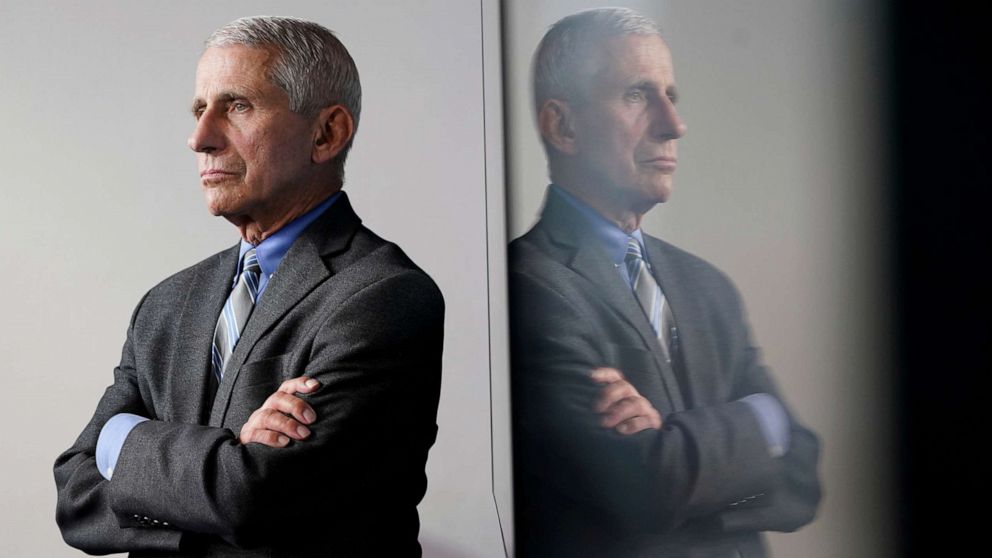
In a separate interview on CBS, Fauci said the answer is a cautious "yes" when asked if he could envision weddings, beach-going and reunions happening in the summer.
"It can be in the cards, and I say that with caution because as I said, when we do that, when we pull back and try to open up the country as we often use that terminology, we have to be prepared that when the infection starts to rear its head again," he said.
On NBC, Fauci cautioned against "conspiracy theories" suggesting that the death count is inflated, saying "there's more of a chance" that the death count due to COVID-19 has been undercounted than the other way around.
He repeated that social distancing and behavior changes are "starting to have a real effect" and that the virus death toll may look "more like 60,000 than the 100,000 to 200,000" initially predicted.
Fauci expressed optimism that, once there are widespread antibody tests available, there may be "something akin to" letting people go back to work if they are found to have been infected and were asymptomatic.
"It's likely, we need to prove it, that once you've been infected and you have an antibody profile you are very likely protected against subsequent challenge to the same virus," he said.
ABC News' Jordyn Phelps
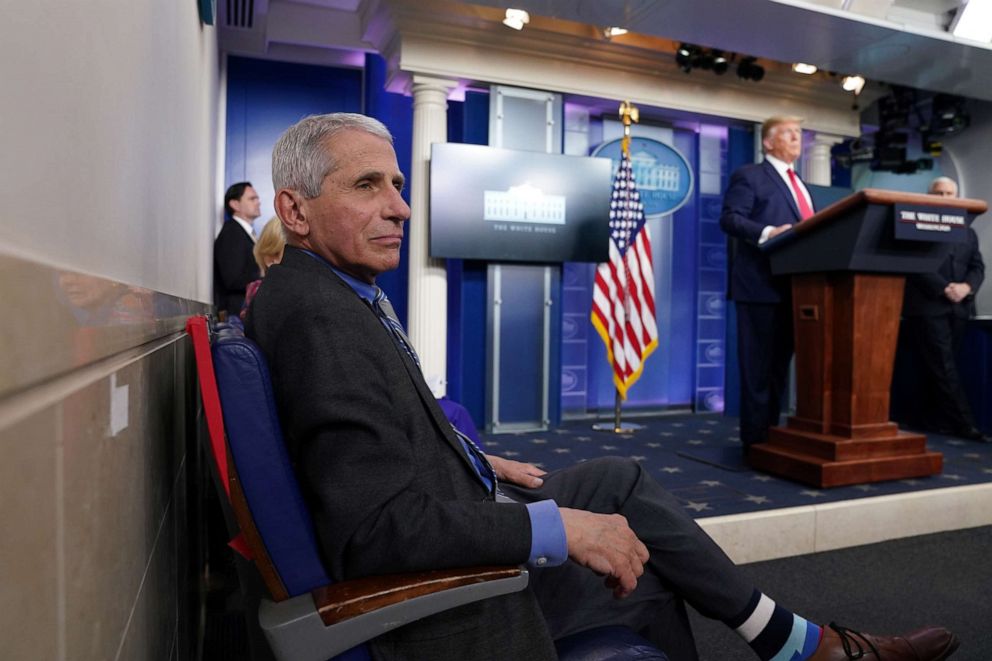
Dept. of Labor: 6.6 million more Americans filed for unemployment last week
A record-shattering 6,648,000 people filed for unemployment last week amid the novel coronavirus pandemic, according to a Department of Labor report released Thursday.
The past three weeks have seen more than 16 million Americans file for unemployed claims -- far more than during the first six months of the Great Recession.
The unprecedented influx in jobless claims has created a number of issues for those in dire need of benefits as Americans across the country report ongoing struggles in applying for unemployment insurance.
Barr criticizes some government-imposed lockdowns "draconian," should be revisited next month
Attorney General William Barr told Fox News Channel Wednesday night that some of the government-imposed lockdown measures meant to slow the spread of the coronavirus outbreak were "draconian" and suggested they be eased next month.
Barr said the federal government would be "keeping a careful eye on" state and local authorities and that officials should be "very careful to make sure that the draconian measures that are being adopted are fully justified."
"When this period of time, at the end of April, expires, I think we have to allow people to adapt more than we have, and not just tell people to go home and hide under their bed, but allow them to use other ways -- social distancing and other means -- to protect themselves," the attorney general said.
When the White House social distancing guidelines expire April 30, Barr said, "I think we have to consider alternative ways of protecting people."
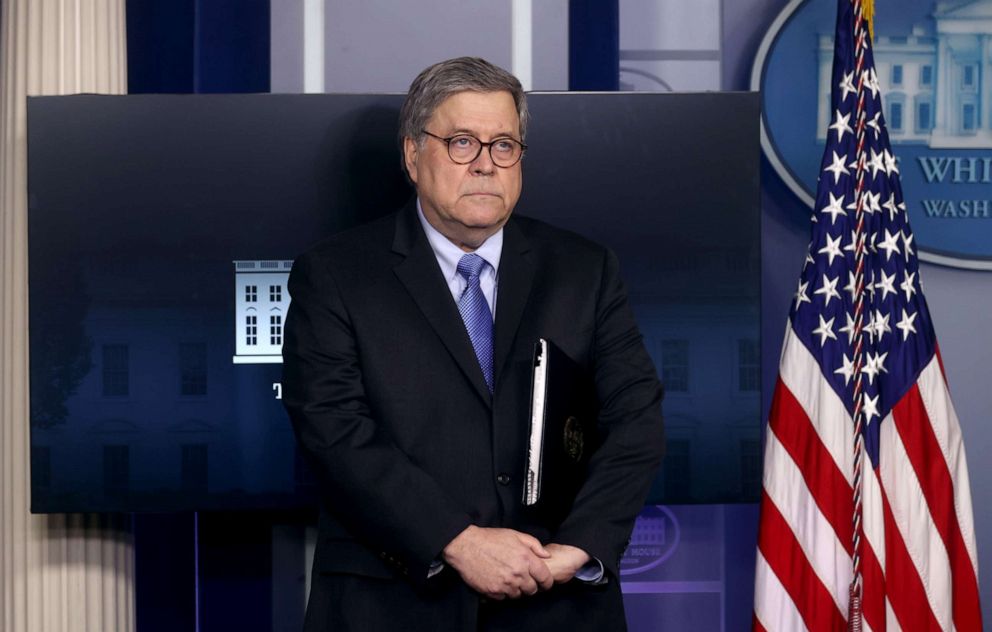
What to know about coronavirus:
- How it started and how to protect yourself: coronavirus explained
- What to do if you have symptoms: coronavirus symptoms
- Tracking the spread in the US and Worldwide: coronavirus map
